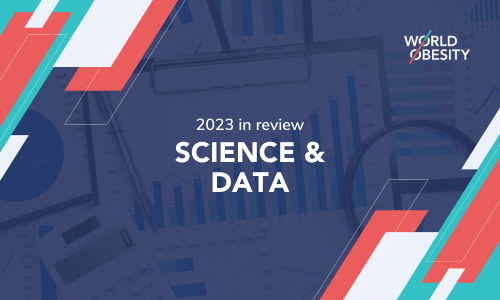2023 in review: Journals
The year 2023 marks many changes for World Obesity’s four scientific journals - Obesity Reviews, Clinical Obesity, Pediatric Obesity, and Obesity Science and Practice. These journals are the jewels of the World Obesity crown.
The Publications Committee is comprised of the four journal Editors and a diverse group of volunteer advisors with publishing experience. In 2022, Brian Oldfield and Shahrad Taheri onboarded as Editors in Chief of Obesity Reviews and Clinical Obesity respectively, joining David Sarwer and Michael Goran heading Obesity Science and Practice and Pediatric Obesity respectively. We’ve seen a reorganisation of Editorial Boards with recruitment of fresh faces as Associate Editors. The Publications Committee provides a forum for the Editors to share their experiences and learn from each other and to gain support from Ellie Needs, Philip Shaw, Fatima Cody Stanford, Nick Finer and Donna Ryan, who also serve on the Committee.
A significant activity in 2023 was the review of our publishing contracts and planning for future negotiations. It’s been rewarding to see the smooth transition of our journal leadership and the development of clear plans for the future.
Please read on for a brief report on each of our journals from the respective EiCs.
- Donna Ryan, World Obesity Federation Publications Committee Chair

The changes that we have seen recently at Obesity Reviews (OBR) began last year with the appointment of a new Editor in Chief. As was pointed out in last year’s report, the intention of these adjustments has been to maintain the quality and standing of the Journal enjoyed under the remarkable stewardship of David York.
Heralded in the 2022 report were changes in the structure of the Board and its mode of operation and these are now in place. We have doubled the size of the Editorial Board with the introduction of 16 Associate Editors, an echelon that did not exist previously. These new appointments balance gender and geography across the Board and bring to the group representation of well-established luminaries and rising stars. They bring expertise in the pillars of OBR, based on submissions, in clinical research including bariatric surgery; paediatric research including clinical, behavioural and epidemiological aspects of obesity; public health encompassing epidemiology, nutrition and policy; and basic science. The hope is that these new members will help shoulder the load of the review process but also represent the cornerstones mentioned above.
We also had a meeting of the Board at Obesity Week, Dallas in October which was attended in person and online. From my perspective, this was an extremely helpful process dealing with vexed issues extending from ways to enhance the review process at OBR and the strengthening of our representation in narrative reviews by experts in the field, to the more general concerns in journal publishing of Open Access and the widespread increasing difficulty in recruiting qualified reviewers. This was facilitated by Claire Dowbekin, the new liaison person with Wiley who brought valuable perspectives but also provided metrics that showed OBR to be on par with other journals in its class in terms of user experience and that it topped the field in its impact factor. As part of these metrics, the two most downloaded papers in OBR in 2022 /2023 (as at end October 2023) were one centred on weight stigma which is, thankfully, commanding its due attention, and another providing a Consensus on the state of obesity in SE Asia, one of the burgeoning hotspots in world-wide obesity.
Looking to 2024, the hope is to build on these developments and improve performance in reviewing submissions and turnaround times.
Thanks to Board members, new and existing for their support and hard work.

Clinical Obesity received its first impact factor this year placing it further in a prime position as the key clinical journal aiming to bring the latest clinical research and practice to significantly impact the care of people with obesity.
The journal has been receiving an increasing number of high quality submissions and has been striving to improve processes for manuscript review and decisions. The editorial board has been expanding and will continue this expansion to bring a more diverse expertise into the editorial board.

Pediatric Obesity has sustained a strong presence in 2023, maintaining our impact factor close to 4.0. As I write this summary in late November, we are projected to have received a total of 318 submissions which is down from the 2022 total of 422 submissions. Our team of 23 Associate Editors from 10 countries has continued to grow and they are dedicated to timely and high-quality reviews, which is always a challenge. However, we have maintained a rapid turnaround with an average of 26 days to first decision and 32 days to final decision for 2023. Like many other Journals, our biggest challenge is finding reviewers.
Our top five downloaded papers in 2023 (as at end October) were:
- Children and adolescents' exposure to food and beverage marketing in social media apps
- Mediators of the association between childhood body mass index and educational attainment: Analysis of a UK prospective cohort study
- Positive parenting approaches and their association with child eating and weight: A narrative review from infancy to adolescence
- Impact of the COVID‐19 pandemic on elementary schoolers' physical activity, sleep, screen time and diet: A quasi‐experimental interrupted time series study
- Extended international (IOTF) body mass index cut‐offs for thinness, overweight and obesity

Obesity Science and Practice enjoyed another strong year in 2023. At the onset of the year, we published a collection of articles on Obesity in Asia. In the middle of the year, we received our first Journal Impact Factor of 2.2 as well as our first CiteScore of 3.6. While we would always like these numbers to be as large as possible, they do reflect the strength of the journal as an open access outlet for high quality scholarship. We continue to receive a steady stream of submissions from established research groups and emerging scholars from around the world. As result, I anticipate our metrics will improve when they are evaluated again.
As 2023 comes to an end, our most frequently downloaded papers reflect both the history of the journal as well as its present. One paper was published in 2016 and another in 2017, giving both several years to be used to inform research and scholarship. The other two are from 2022 and 2023, suggesting that scholars are finding our most recent publications and using them to inform their work essentially in real time. These four papers are listed below. I’d be remiss, however, if I didn’t note that seven of the ten most downloaded papers this year have been published since 2020, underscoring how the science in the journal is shaping the rapidly evolving obesity landscape.
- Alternate‐day versus daily energy restriction diets: which is more effective for weight loss? A systematic review and meta‐analysis
- Liraglutide for weight management: a critical review of the evidence
- Inositol supplementation and body mass index: a systematic review and meta-analysis of randomized clinical trials
- Obesity and chronic kidney disease: a current review
In early 2024, we will publish another special issue dedicated to Emerging Treatments for Obesity. Whether it is new science related to anti-obesity medications, advances in metabolic and bariatric surgery, or novel strategies to use technology to promote consumption of a healthy diet and increased physical activity, ours is a fast-paced field. I trust that the pace of these changes are as exciting to you as they are to me. It is one of several things that makes serving as Editor-in-Chief of the journal such as rewarding experience.
Related News
View all
News Dec 22, 23
2023 Year-end letter from our President and CEO
Our President, Louise Baur & CEO, Johanna Ralston, reflect on our collective achievements in 2023.
Read Post
Events News Dec 22, 23
2023 in review: Events
The World Obesity Events Team were in full swing this year with events held around the world.
Read Post
News Data Dec 22, 23
2023 in review: Science & Data
2023 was a year of significant progress and increased engagement on our Global Obesity Observatory.
Read Post